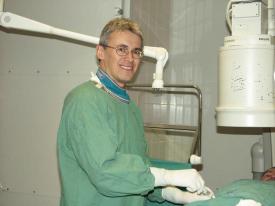In a world without borders the only way to keep people is to pay them well


1 December 2011
December 1, 2011; by: P.K.; section: Interviews & Portraits
He has implemented a revolutionary change in the treatment of acute myocardial infarction thus saving the lives of hundreds of people the world over. The man in question is MUDr. Petr Widimský, DrSc., FESC, head of the cardiology clinic at Prague’s Vinohrady hospital. In November, this internationally renowned specialist from the Charles University 3rd Faculty of Medicine was granted the National Government Award Česká hlava for 2011. In an interview with i-Forum, he discusses research as well as football.
Both your father and brother specialize in cardiology. When did this field become close to your heart?
During my studies I concluded that I wanted to specialize in a field where I would use my brain more than my hands, so I ruled out the surgical disciplines and opted for internal medicine. I got in touch with cardiology during my studies when I worked on the side as an attendant in a mobile coronary unit. In 1979 I joined the Clinic of Internal Medicine at the Prague Vinohrady hospital which was then headed by Professor Vlastimil Víšek. To his question what kind of research I would like to pursue I answered categorically that anything but cardiology because I was not going to live in the shadow of my father for the rest of my life. Professor Víšek gave me four months to think about it and during that time I found out that cardiology was perhaps the most interesting part of the whole of internal medicine.
So you are still fighting your father...
No, we love each other (laughs). There has never been any rivalry between us, we have a very good relationship. My dad never influenced my decisions in any way. I always decided for myself but he was a positive role model for me.
So the apple did not fall far from the tree...
Of course, when I was a little boy, I hated it when instead of playing with me when he came home late, my dad would sit behind his desk and work in the evenings and on weekends. I didn’t like that and I was very happy when he went to play football with me. When I got a little wiser as high school approached, I got a whole different outlook on that.
You were honoured with the Česká hlava award this year for your outstanding scientific achievements. What do you value the most in your scientific career?
I believe the greatest achievement so far is the fact that we managed to present our results in the most prestigious sections (the Hotline and Late Breaking Trials sections) at world cardiology congresses as many as nine times. To my knowledge no other centre in the world has presented nine results in those sections. Most often it is commercially financed company studies that are presented there. I believe our system of treatment of patients with acute myocardial infarction which we have implemented in the Czech Republic and later around the world is unique.
How did you manage to implement the revolutionary change in the treatment of acute myocardial infarction in the Czech Republic?
In the past, heart attacks were treated in the nearest hospital where they lay the patient down, did not move them and gave them an infusion of a blood clot buster (a thrombolytic drug). Ten to eighteen percent of patients did not survive this treatment. I was lucky to work at intervention centres in the Netherlands for two years which pioneered coronary angioplasty, a revolutionary treatment of heart attacks. When I returned to my clinic, we introduced the method and in a year’s time the death rate at our clinic dropped from eleven to four percent.
We put together a study project named PRAGUE where heart attack patients were randomized in a small hospital: one group was treated by the standard method of the time, while another was administered a thrombolytic drug and then transported to our clinic (or three other cardio-centres around the country) and the third was transported straight to the cardio-centre without being given the clot buster. With the support of the Czech Society of Cardiology, 21 Czech hospitals joined the project. We presented the results of the study at a cardiology congress in Barcelona in 1999 and afterwards a whole series of similar studies were carried out around the world confirming our results.
A follow-up PRAGUE study involved 850 patients from 51 hospitals and thrombolytic treatment of heart attacks was terminated in the Czech Republic based on its results. A year later the approach to treatment was changed in Europe and two years later in America. Now a European project titled Stent for Life is underway which I had the privilege to put together. Its goal is to introduce this method in those European countries where it has not been implemented yet.
Czech cardiology has a good reputation in the world. I suppose you don’t have problems – compared to other fields – to maintain young scientists and doctors at home...
Unfortunately many of the best graduates from medical faculties leave for foreign countries straight after graduation and don’t even start working the Czech Republic. In a free world without borders we can’t keep people any other way than by paying them well. Patriotism has disappeared in today’s generation. But my generation still feels it. As you can see, despite offers from abroad I am still working here (and I’m happy to), but the young generation sees it differently. They are more Europeans than Czechs.
|
|
|
Professor Widimsky is Head of the Cardiocenter (cardiology & cardiac surgery) and chief of its Cardiology Department, 3rd Faculty of Medicine, Charles University, Prague. |
